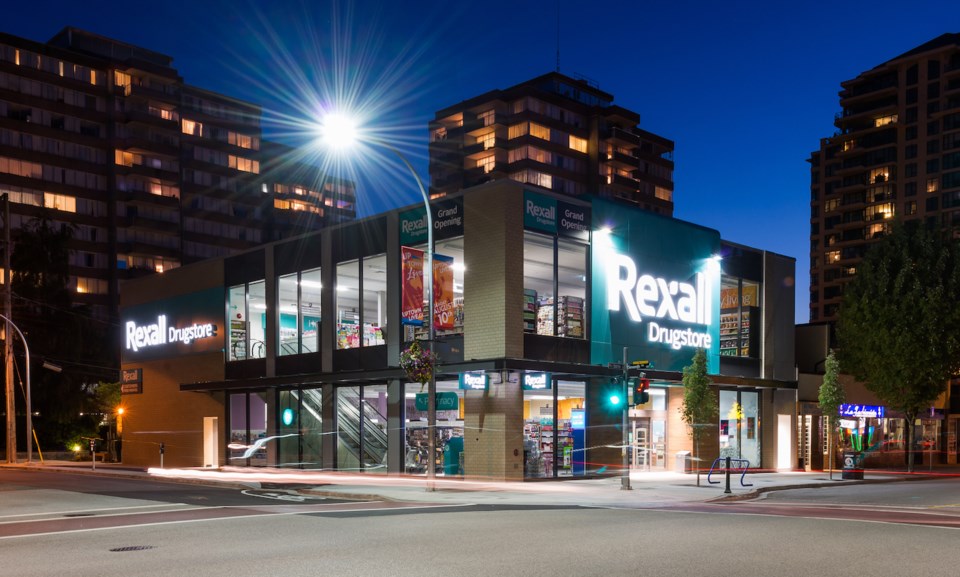While most modern commercial real estate development and investments lean to mixed-use projects, single-tenant commercial properties can offer advantages for investors, according to a real estate team that concentrates on the niche sector.
Single-tenant buildings often provide investors with a corporate client willing to sign a long-term lease agreement that are usually triple-net or even quadruple net, where the tenant pays not only the taxes and maintenance costs but also covers all other property and maintenance expenses, explained Jon Buckley, who, with Joe Genest and Curtis Leonhardt, form a Vancouver-based Marcus & Millichap real estate team that has brokered sales of more than $280 million worth of single-tenant transactions in Western Canada over the past three years.
“It can be a carefree, hands-off deal for the investor,” Buckley said.
A recent sale of a Royal Bank property in Maple Ridge that has operated at the same corner location since the 1970s is an example. The building has a triple-net lease in place that runs to September 2022. The $5.03 million sale to an offshore investor closes in February.
In New Westminster, a single-tenant two-storey Rexall pharmacy, secured with a 15-year, triple-net lease backed by a corporate covenant that expires in 2029, is currently listed at just over $9 million.
“Once you start looking, there is tremendous number of these properties. There are a lot of corners out there,” Buckley said.
Single retail tenants of standalone buildings can include major banks, pharmacy giants and fast-food restaurants, all of which are proving largely immune to the pandemic, Buckley said, but added transactions can involve industrial property as well.
Taxes and local regulations can persuade an owner of a single-tenant property to sell, or make some properties more valuable to investors or developers.
Under B.C.’s tax policy, for instance, property taxes are based on the highest and best possible use, so some Metro Vancouver owners find that selling a property is preferable to paying soaring annual taxes.
An example is a long-time sporting goods store in Vancouver’s Mount Pleasant area where the owners, facing an annual property tax increase to more than $90,000 on the aging one-storey building, sold it in 2018 for $20.4 million. The buyer developed the site into a four-storey light-industrial strata development, after rezoning.
Such transactions and rezoning are more common in Metro Vancouver, where land in a good location can be worth far more than the old building that occupies it, Buckley explained.
He added that some municipalities have banned new drive-through fast-food restaurants. This makes existing drive-throughs, which are allowed to operate, a prime investment target.
In some cases, banks or other corporate owners will sell their bricks-and-mortar assets under a lease-back arrangement with triple-net or quadruple-net leases that can run 10 years or longer. Others want to cash in on the real estate or take assets off their balance sheet.
“Most of the buyers are investors, but there are also developers and owner-users taking over the existing space,” Leonhardt said. Developers and investors are often in a much better position to monetize the real estate than the corporate owner, he added.
Of the 59 single-tenant properties the Marcus & Millichap team sold between 2018 and 2020, 15 were in Metro Vancouver and 39 were in small towns and mid-size cities from Vancouver Island to Alberta.
In some secondary markets, it is not uncommon for investors to receive a 6 per cent capitalization rate under a corporate lease for 10 years, according to Buckley.
Generally, however, single-tenant properties in larger urban centres return a lower capitalization rate than a property that is part of a larger development.
“This is due to a multitude of factor, including relative deal size, ease of management and building-to-site size ratios,” Leonhardt said.
When asked what happens if a single-tenant retailer is forced to close, or even go bankrupt due to the pandemic, Buckley said that would normally involve a smaller retailer, while the majority of single-tenant retail properties are backed by a corporate covenant.
Buckley said the right single-tenant property offers investors a trifecta of advantages: long-time leases to a deep-pocket tenant, low oversight and, especially in Metro Vancouver, future appreciation of the asset.
“We are seeing increased investor demand for single-tenant properties,” Leonhardt said, noting that most of the sales are for less than $5 million which attracts a large buyer pool. He expects his office to sell at least a 20 such properties this year in B.C. and Alberta.
Lenders, Buckley said, are also on board, even for retail properties.
“Financing for these products, with the right covenants and terms is remarkable,” he said. “We are seeing lower quotes for financing now than we have ever seen.”



